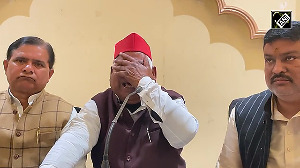More than elation, there was a sense of quiet satisfaction at home with Prime Minister Atal Bihari Vajpayee's powerful rejoinder to General Pervez Musharraf's outburst at the UN General Assembly. Pakistan's president needed to be told a few home truths about his brazen duplicity and his penchant for blackmail. When he followed his UN intervention with the firm assertion that the atmosphere is not conducive to talks, Vajpayee did more than dispel an impression in Islamabad that his hand of friendship was born of weakness. He simultaneously removed the confusion that has dogged India's foreign policy and security establishments for the past five months.
This is not to suggest that the prime minister blundered in believing that the post-December 2000 stalemate should be broken. The test of political leadership lies in creating opportunities, sometimes out of nothing. When Menachem Begin flew to Cairo and embraced Anwar Sadat in 1978, it was an act of audacity. Yet, they established the foundations of an Israeli-Egyptian understanding that overturned three decades of Arab grandstanding, and still lives on.
Vajpayee's bus ride to Lahore in 1999, the Agra summit and Srinagar speech aimed precisely at such an outcome. Alas, the results on each occasion have been disappointing. We offer peace, they reply with a war in Kargil, an attack on Parliament, bomb blasts in Mumbai and jihad in Kashmir.
Perhaps the time has come to review the assumption that we are dealing with an otherwise decent neighbour who merely claims some of our land as his own.
We love to believe that the kindness shown to a Pakistani child with a heart ailment will melt even the most hardened souls across the border. We love to believe that the overpowering strength of the hospitality we experience during casual visits to Lahore means that politics is the only hurdle to rapprochement. And we love to believe, as Rajiv Gandhi once put it, that the Taj Mahal is as much theirs as Mohenjodaro is ours.
The time for such romantic piffle is over. Actually, there was never any basis for it. The Quaid-e-Azam may have been a clubbable soul who loved Malabar Hill as much he loved Hampstead, and certainly more than he appreciated Karachi. But there was an inescapable logic to the creation of Pakistan that has reached fruition now.
To put it bluntly, India and Pakistan belong to different civilisations. Yes, there was a common heritage once but it is naive to believe that there is anything remotely in common between Mohammed Ali Jinnah and Ghazi Baba. The cultural convergence between India and Pakistan belongs to history. Only the dregs of India like Dawood Ibrahim and the tribe of professional capitulationists who assemble at Wagah each Independence Day believe otherwise. A recognition of this separateness must form the basis of all future dealings with Pakistan.
Second, we must realise that we are not dealing with a failed state if only that was true but with what V S Naipaul once called a criminal enterprise. Just because some of their representatives are charming, convivial and keep a good table doesnt make the Pakistani state any less venal. Remember the lies Musharraf uttered before the Agra summit about Dawood not being in Pakistan and look at the stories coming out of Karachi last week.
Third, we must constantly bear in mind that Pakistan's strategic objective remains the bleeding of India. The fulfilment of that goal doesnt merely involve sending its mujahideen to Kashmir and triggering explosives in Mumbai, it necessitates creating jihadi networks in Hyderabad and printing counterfeit Rs 500 notes.
Finally, it means never letting our guard down. We made that mistake in 1999 and lost some 700 of our soldiers in Kargil as a result. This time we didn't repeat the error. For this we must also be grateful to our diplomats and our intelligence establishment that refused to be swayed by vacuous emotionalism.
For too long India has allowed its responses to be guided by the sanctimoniousness of a professional peace lobby. It is time we ignored these appeasers of jihad. Let the prime minister's pronouncement that India cannot negotiate with terrorists be the final word on Pakistan.






 © 2025
© 2025